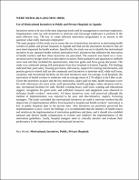| dc.description.abstract | WERE MUBALAKA (2012 M191 10030)
Use of Motivational Incentives in Public and Private Hospitals in Uganda
Incentives seem to be one of the most important tools used by management to motivate employees. Organisations come up with incentives to motivate and encourage employees to perform in the most effective way. The key to create efficient motivation programmes is an answer to the question; what really motivates employees?
The main purpose of this study was to assess the use of motivation incentives in motivating health workers in public and private hospitals in Uganda and find out the motivation incentives that are seen most important by health workers. Specifically, the study was set to identify the motivational
incentive in use, measure health workers motivation level, incentives that influence the motivation of health workers and how these incentives are perceived. The research was based on a cross-sectional survey design which was descriptive in nature. Both qualitative and quantitative methods were used and they included the questionnaire, interview guide and focus group discussion. The study was conducted among 244 participants from four hospitals in Eastern Uganda. The findings indicated that; paid salary, housing provisions, allowances, support for training and education, and pension given to retired staff are the commonly used incentives to motivate staff, while staff tours, vacations, and recreational facilities are the least incentives used. On average, in all hospitals, the motivation of health workers is moderate with an average mean of 2.79 subject to the Likert scale. Given the incentives in place and the low motivation, salary paid on time, health insurance cover for staff, allowances for extra work, staff sponsorship, benefit packages, salary advances and to-ups, recreational facilities for staff, flexible working hours, staff tours, training and educational support, recognition for good work, and sufficient resources and equipment were observed to influence health workers‟ motivation. All these incentives were well perceived although the method of implementation was reported to be poor and discriminative, majorly favouring managers. The study concluded that motivational incentives are used to motivate workers but the degree/rate of implementation differs from hospital to hospital and health workers‟ motivation is low in public hospitals than in the private ones. Also incentives are positively perceived but implementation is poor. Given the findings, it is recommended that the ministry of health enacts and reinforces the implementation of motivation guidelines and plans, and it should also establish national and district health commissions to oversee and reinforce the implementation of the motivation guidelines. Lastly, hospital mangers need to critically monitor and evaluate their performance in the implementation of motivational incentives.
Key Words: Motivational, Incentives, Public, Private Hospitals | en_US |


